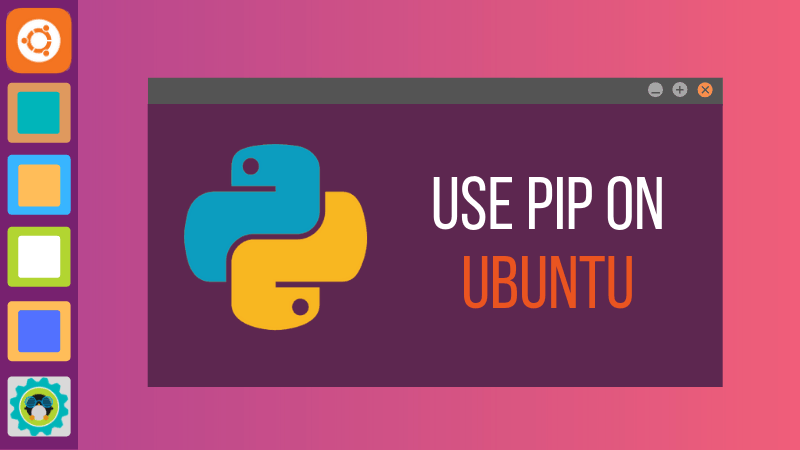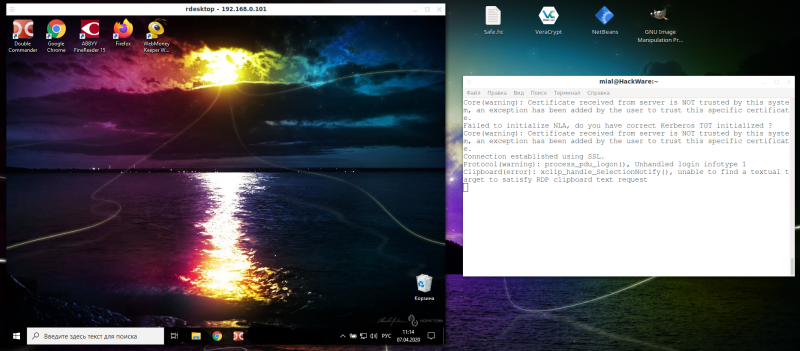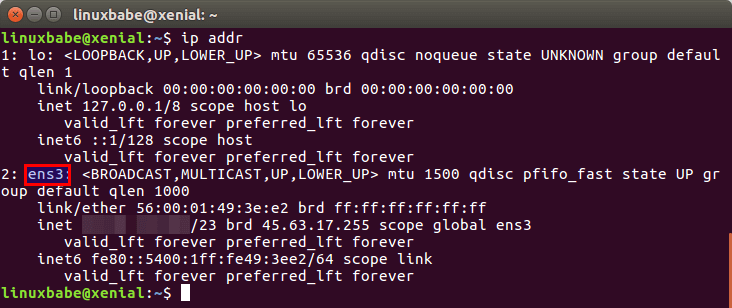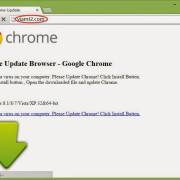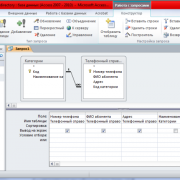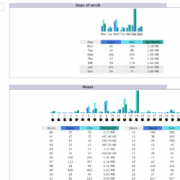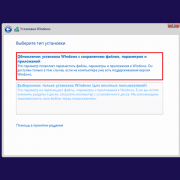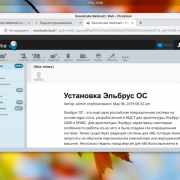Ekiga
Содержание:
- Register to a commercial VoIP provider (landline and mobile phones)
- Andra paket besläktade med ekiga
- Інші пакунки пов’язані з ekiga
- Первое применение
- Настройка софтфона Ekiga
- Features
- ekiga ile İlgili Diğer Paketler
- Ekiga.net services (free calls PC-to-PC)
- Development snapshots
- Install the latest version
- ekiga ile İlgili Diğer Paketler
- Ekiga 3.3.2 [UNSTABLE] available
- Configuration
- History
- linux на десктопе → Настройка Ekiga для работы с SipNet
- Інші пакунки пов’язані з ekiga
- Other Packages Related to ekiga
Register to a commercial VoIP provider (landline and mobile phones)
You can register to a commercial VoIP provider to place calls to normal phone line or cell phone. Ekiga allows you to register several VoIP providers.
Default provider
There is no obligation for you to use the default provider.
The default provider is Diamondcard Worldwide Communication Service, which offers these rates
-
To purchase the account, go in Tools -> PC-To-Phone Account. You absolutely need to purchase the account from the PC-To-Phone configuration window or it won’t work.
- Wait for the mail that will give you a login and a PIN.
- Enter that login and PIN in the appropriate fields in the window and enable the PC-To-Phone service.
You are now ready to do PC-To-Phone calls at very low rates all over the world.
To dial a number, simply add «00» followed by the country code, and by the phone number you want to reach.
For example, sip:003210111111 to call number 10111111 in Belgium.
Broadvoice Support
In order to setup Ekiga to work with Broadvoice which offer those rates, use the following settings.
Figure out which proxy is closest to you:
# proxy.lax.broadvoice.com
# proxy.dca.broadvoice.com
# proxy.mia.broadvoice.com
# proxy.atl.broadvoice.com
# proxy.chi.broadvoice.com
# proxy.bos.broadvoice.com
# proxy.nyc.broadvoice.com
Ekiga Preferences:
-
SIP Settings → Outbound SIP Proxy: proxy.broadvoice.com
-
Codecs → Video Codecs → Disable (uncheck) video support or else you will get a codec error.
Account Information:
- Registrar: sip.broadvoice.com
-
User: <10 digit broadvoice telephone number>
-
Password: <obtained requesting it from broadvoice support>
-
Authentication Login: <10 digit broadvoice telephone number>
- Realm/Domain: sip.broadvoice.com or Broadworks
In the case where you need to troubleshoot, start ekiga with ‘ekiga -d 4’
How to set up a Gizmo account
Gizmo offers those rates.
To subscibe an account, go here and open a Sipphone account. Then, with your account number and your password go there, you’ll be prompted to choose a Gizmo name.
Now go to menu Edit → Accounts → Add
|
Account name: |
whatever you wish |
|
Registrar: |
proxy01.sipphone.com |
|
User: |
Your Gizmo number (1747xxxxxxx) |
|
Password: |
Your password |
Then try the echo test: sip:1393613@proxy01.sipphone.com
How to set up a Wengo account
Wengo offer this rates.
Once you’ve registered at https://secure.wengo.com/register/wengophone/index.php?yawl=wengo.public.homePage&yawl=wengo.subs_152.persistOffer&lang=eng , visit
... <userid>Username</userid> ... <password>Password</password> ...
Now go to menu Edit → Accounts → Add
|
Account name: |
whatever you wish |
|
Registrar: |
voip.wengo.fr |
|
User: |
the username from the ws.wengo.fr url above |
|
Password: |
the password from the ws.wengo.fr url above |
Now try the echo test: sip:333@voip.wengo.fr
Andra paket besläktade med ekiga
-
-
dep:
gconf-service - GNOME configuration database system (D-Bus service)
-
dep:
-
-
dep:
gconf2
(>= 2.28.1-2) - GNOME configuration database system (support tools)
-
dep:
-
-
dep:
gnome-icon-theme - GNOME Desktop icon theme
-
dep:
-
-
dep:
libatk1.0-0
(>= 1.12.4) - ATK accessibility toolkit
-
dep:
-
-
dep:
libavahi-client3
(>= 0.6.16) - Avahi client library
-
dep:
-
-
dep:
libavahi-common3
(>= 0.6.16) - Avahi common library
-
dep:
-
-
dep:
libavahi-glib1
(>= 0.6.16) - Avahi GLib integration library
-
dep:
-
-
dep:
libboost-signals1.58.0 - managed signals and slots library for C++
-
dep:
-
-
dep:
libc6
(>= 2.14) - GNU C Library: Shared libraries också ett virtuellt paket som tillhandahålls av
libc6-udeb
-
dep:
libc6
(>= 2.17)
-
dep:
libc6
(>= 2.4)
-
dep:
-
-
dep:
libdbus-glib-1-2
(>= 0.88) - simple interprocess messaging system (GLib-based shared library)
-
dep:
-
-
dep:
libgcc1
(>= 1:3.0) - GCC support library
-
dep:
libgcc1
(>= 1:4.1.1)
-
dep:
libgcc1
(>= 1:4.4.0)
-
dep:
libgcc1
(>= 1:4.7)
-
dep:
-
-
dep:
libgconf-2-4
(>= 3.2.5) - GNOME configuration database system (shared libraries)
-
dep:
-
-
dep:
libgdk-pixbuf2.0-0
(>= 2.22.0) - GDK Pixbuf library
-
dep:
-
-
dep:
libglib2.0-0
(>= 2.37.3) - GLib library of C routines
-
dep:
-
-
dep:
libgtk2.0-0
(>= 2.24.0) - GTK+ graphical user interface library
-
dep:
-
-
dep:
libldap-2.4-2
(>= 2.4.7) - OpenLDAP libraries
-
dep:
-
-
dep:
libnotify4
(>= 0.7.0) - sends desktop notifications to a notification daemon
-
dep:
-
-
dep:
libopal3.10.10 - Open Phone Abstraction Library — successor of OpenH323
-
dep:
-
-
dep:
libpango-1.0-0
(>= 1.14.0) - Layout and rendering of internationalized text
-
dep:
-
-
dep:
libpt2.10.10v5 - Portable Tools Library
-
dep:
-
-
dep:
libsasl2-2 - Cyrus SASL — authentication abstraction library
-
dep:
-
-
dep:
libstdc++6
(>= 5.2) - GNU Standard C++ Library v3
-
dep:
-
-
dep:
libx11-6 - X11 client-side library
-
dep:
-
-
dep:
libxext6 - X11 miscellaneous extension library
-
dep:
-
-
dep:
libxml2
(>= 2.7.4) - GNOME XML library
-
dep:
-
-
dep:
libxv1 - X11 Video extension library
-
dep:
-
-
rec:
gvfs - userspace virtual filesystem — GIO module
-
rec:
-
-
rec:
yelp - Help browser for GNOME
-
rec:
Інші пакунки пов’язані з ekiga
-
-
dep:
gconf-service - GNOME configuration database system (D-Bus service)
-
dep:
-
-
dep:
gconf2
(>= 2.28.1-2) - GNOME configuration database system (support tools)
-
dep:
-
-
dep:
gnome-icon-theme - GNOME Desktop icon theme
-
dep:
-
-
dep:
libatk1.0-0
(>= 1.12.4) - ATK accessibility toolkit
-
dep:
-
-
dep:
libavahi-client3
(>= 0.6.16) - Avahi client library
-
dep:
-
-
dep:
libavahi-common3
(>= 0.6.16) - Avahi common library
-
dep:
-
-
dep:
libavahi-glib1
(>= 0.6.16) - Avahi GLib integration library
-
dep:
-
-
dep:
libboost-signals1.58.0 - managed signals and slots library for C++
-
dep:
-
-
dep:
libc6
(>= 2.14) - GNU C Library: Shared libraries also a virtual package provided by
libc6-udeb
-
dep:
libc6
(>= 2.17)
-
dep:
libc6
(>= 2.4)
-
dep:
-
-
dep:
libdbus-glib-1-2
(>= 0.88) - simple interprocess messaging system (GLib-based shared library)
-
dep:
-
-
dep:
libgcc1
(>= 1:3.0) - GCC support library
-
dep:
libgcc1
(>= 1:4.1.1)
-
dep:
libgcc1
(>= 1:4.4.0)
-
dep:
libgcc1
(>= 1:4.7)
-
dep:
-
-
dep:
libgconf-2-4
(>= 3.2.5) - GNOME configuration database system (shared libraries)
-
dep:
-
-
dep:
libgdk-pixbuf2.0-0
(>= 2.22.0) - GDK Pixbuf library
-
dep:
-
-
dep:
libglib2.0-0
(>= 2.37.3) - GLib library of C routines
-
dep:
-
-
dep:
libgtk2.0-0
(>= 2.24.0) - GTK+ graphical user interface library
-
dep:
-
-
dep:
libldap-2.4-2
(>= 2.4.7) - OpenLDAP libraries
-
dep:
-
-
dep:
libnotify4
(>= 0.7.0) - sends desktop notifications to a notification daemon
-
dep:
-
-
dep:
libopal3.10.10 - Open Phone Abstraction Library — successor of OpenH323
-
dep:
-
-
dep:
libpango-1.0-0
(>= 1.14.0) - Layout and rendering of internationalized text
-
dep:
-
-
dep:
libpt2.10.10v5 - Portable Tools Library
-
dep:
-
-
dep:
libsasl2-2 - Cyrus SASL — authentication abstraction library
-
dep:
-
-
dep:
libstdc++6
(>= 5.2) - GNU Standard C++ Library v3
-
dep:
-
-
dep:
libx11-6 - X11 client-side library
-
dep:
-
-
dep:
libxext6 - X11 miscellaneous extension library
-
dep:
-
-
dep:
libxml2
(>= 2.7.4) - GNOME XML library
-
dep:
-
-
dep:
libxv1 - X11 Video extension library
-
dep:
-
-
rec:
gvfs - userspace virtual filesystem — GIO module
-
rec:
-
-
rec:
yelp - Help browser for GNOME
-
rec:
Первое применение
When you start Ekiga for the first time, the 10 step Configuration druid will help you to correctly configure Ekiga. It is strongly recommended that you complete the druid.
More help about the druid (step-by-step)
How do I get a free sip:address ? (step 3/10)
Letters and numbers will do just fine.
Just follow the link given in the dialog to get an account if you do not have one, then fill in your username and password.
Your address will be sip:Username@ekiga.net
Please press ’Forward’ after having entered all required information to continue.
How do I place a call ?
When you’re done the druid and if you have an account on ekiga.net, you can call the echo test: sip:500@ekiga.net You’ll be able to check if you can reach the service (the SIP network), if your sound setup is ok (you can hear yourself with a delay) and if your webcam works (you can see yourself).
If you know the SIP address of the party that you wish to call, you may enter that adress into the sip: input box at the top of the screen and press the Connect button; eg: sip:foo@ekiga.net and pressing the Connect button would call the user at that address.
Can I use several sip:addresses ?
Yes. First you have to register to the provider (e.g. ekiga.net). Then to add your new sip:address, go to menu Edit -> Accounts -> Add
|
Account name: |
enter the name for the Edit -> Accounts window |
|
Registrar: |
ekiga.net (or another provider) |
|
User: |
Your Username |
|
Password: |
Your password |
Настройка софтфона Ekiga
Звонки с персонального компьютера
Установка
Как видно на скриншоте ниже, процесс установки не отличается ничем особенным, при желании можно просто везде кликнуть далее.

После установки софтфона начнется процесс установки GTK2-Runtime.Все оставляем по умолчанию и кликаем везде “Next”

После запустится мастер настройки софтфона, состоящий из 9 шагов:

Ставим галочку внизу, ничего не заполняем и нажимаем Forward:


Оставляем настройку по умолчанию:

Производим настройку аудиоустройств – также можно оставить по умолчанию:

Производим настройку видеоустройств – также можно оставить по умолчанию:

Выкладка введенных вами значений, кликаем Apply:

Далее включается сам телефон, идем по пути Правка → Учетные записи → Добавить учетную запись SIP

Прописываем все необходимые поля:
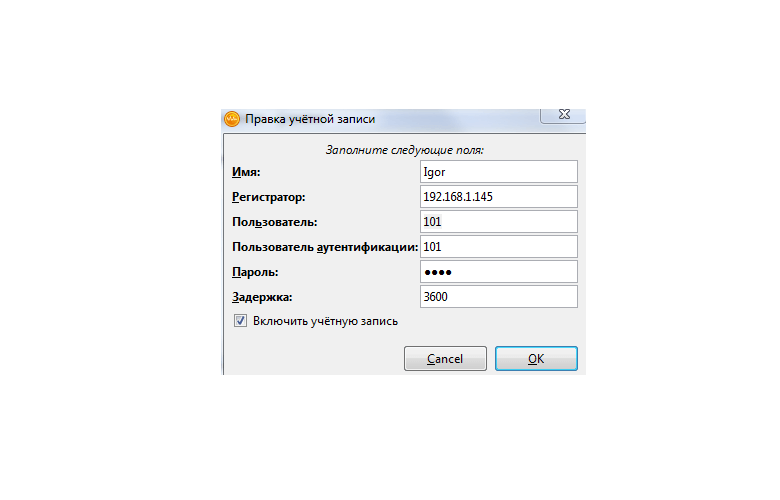
- Имя — требуемое имя
- Регистратор — адрес вашей АТС
- Пользователь — юзернейм
- Пользователь аутентификации — номер экстеншена
- Пароль — пароль
- Задержка — название говорит само за себя, можно оставить как есть
После нажимаем на Ок и на этом настройка закончена, если все в порядке с АТС – можно звонить!
Features
Features of Ekiga include:
Integration
Ekiga is integrated with a number of different software packages and protocols such as LDAP directories registration and browsing along with support for Novell Evolution so that contacts are shared between both programs and ZeroConf (Apple Bonjour) support. It auto-detects devices including USB, ALSA and legacy OSS soundcards, Video4linux and FireWire camera.
User interface
Ekiga supports a Contact list based interface along with Presence support with custom messages. It allows for the monitoring of contacts and viewing call history along with an addressbook, dialpad, and chat window. SIP URLs and H.323/callto support is built-in along with full-screen videoconferencing (accelerated using a graphics card).
Technical features
- Call forwarding on busy, no answer, always (SIP and H.323)
- Call transfer (SIP and H.323)
- Call hold (SIP and H.323)
- DTMF support (SIP and H.323)
- Basic instant messaging (SIP)
- Text chat (SIP and H.323)
- Register with several registrars (SIP) and gatekeepers (H.323) simultaneously
- Ability to use an outbound proxy (SIP) or a gateway (H.323)
- Message waiting indications (SIP)
- Audio and video (SIP and H.323)
- STUN support (SIP and H.323)
- LDAP support
- Audio codec algorithms: iLBC, GSM 06.10, MS-GSM, G.711 A-law, G.711 μ-law, G.726, G.721, Speex, G.722, CELT (also G.723.1, G.728, G.729, GSM 06.10, GSM-AMR, G.722.2 using Intel IPP)
- Video codec algorithms: H.261, H.263+, H.264, Theora, MPEG-4
ekiga ile İlgili Diğer Paketler
-
-
dep:
gconf-service - GNOME configuration database system (D-Bus service)
-
dep:
-
-
dep:
gconf2
(>= 2.28.1-2) - GNOME configuration database system (support tools)
-
dep:
-
-
dep:
gnome-icon-theme - GNOME Desktop icon theme ayrıca şunun tarafından sağlanan bir sanal paket
lubuntu-icon-theme
-
dep:
-
-
dep:
libatk1.0-0
(>= 1.12.4) - ATK accessibility toolkit
-
dep:
-
-
dep:
libavahi-client3
(>= 0.6.16) - Avahi client library
-
dep:
-
-
dep:
libavahi-common3
(>= 0.6.16) - Avahi common library
-
dep:
-
-
dep:
libavahi-glib1
(>= 0.6.16) - Avahi GLib integration library
-
dep:
-
-
dep:
libboost-signals1.65.1 - managed signals and slots library for C++
-
dep:
-
-
dep:
libc6
(>= 2.14) - GNU C Library: Shared libraries ayrıca şunun tarafından sağlanan bir sanal paket
libc6-udeb
-
dep:
libc6
(>= 2.17)
-
dep:
libc6
(>= 2.4)
-
dep:
-
-
dep:
libdbus-glib-1-2
(>= 0.88) - deprecated library for D-Bus IPC
-
dep:
-
-
dep:
libgcc1
(>= 1:3.0) - GCC support library
-
dep:
libgcc1
(>= 1:3.5)
-
dep:
-
-
dep:
libgconf-2-4
(>= 3.2.5) - GNOME configuration database system (shared libraries)
-
dep:
-
-
dep:
libgdk-pixbuf2.0-0
(>= 2.22.0) - GDK Pixbuf library
-
dep:
-
-
dep:
libglib2.0-0
(>= 2.37.3) - GLib library of C routines
-
dep:
-
-
dep:
libgtk2.0-0
(>= 2.24.31) - GTK+ graphical user interface library
-
dep:
-
-
dep:
libldap-2.4-2
(>= 2.4.7) - OpenLDAP libraries
-
dep:
-
-
dep:
libnotify4
(>= 0.7.0) - sends desktop notifications to a notification daemon
-
dep:
-
-
dep:
libopal3.10.10 - Open Phone Abstraction Library — successor of OpenH323
-
dep:
-
-
dep:
libpango-1.0-0
(>= 1.14.0) - Layout and rendering of internationalized text
-
dep:
-
-
dep:
libpt2.10.11 - Portable Tools Library
-
dep:
-
-
dep:
libsasl2-2 - Cyrus SASL — authentication abstraction library
-
dep:
-
-
dep:
libstdc++6
(>= 5.2) - GNU Standard C++ Library v3
-
dep:
-
-
dep:
libx11-6 - X11 client-side library
-
dep:
-
-
dep:
libxext6 - X11 miscellaneous extension library
-
dep:
-
-
dep:
libxml2
(>= 2.7.4) - GNOME XML library
-
dep:
-
-
dep:
libxv1 - X11 Video extension library
-
dep:
-
-
rec:
gvfs - userspace virtual filesystem — GIO module
-
rec:
-
-
rec:
yelp - Help browser for GNOME
-
rec:
Ekiga.net services (free calls PC-to-PC)
Ekiga.net is a free service (no ads) based upon Free Software (SER and Asterisk) ran by the Ekiga team.
Test service
Once you’re registered to http://ekiga.net, you can test your setup and line quality by dialing the echo service: sip:500@ekiga.net
This service only works with PCMU or iLBC audio codecs, and the H.261 video codec.
Audio conference server
If you are using ekiga.net as your VoIP provider, you can access a conference server via the aliases
-
sip:501@ekiga.net to join the public conference room
-
sip:501XXXX@ekiga.net where XXXX is the number of your choice representing the number of the room.
[For example, a group of friends could meet in conference room 1122 by dialing sip:5011122@ekiga.net]
Using 501xxxx, you’ll be asked for a «PIN number»: dialing a number you can protect the access to your conference room or just dialing # will make this conference public.
How to place a call to other SIP providers (peering)
Peering is the term given to agreement between VoIP Service Providers which enables the users of one service to call users of another.
This is usually implemented by dialing a special prefix number and then the number of the receipitant (on the ‘other’ service).
With Ekiga.net, you can use SipBroker prefixes.
Here are some exemples of prefixes:
|
Prefix |
Registrar |
Description |
|
*282 |
sip.broadvoice.com |
Broadvoice, do not work actually (2007 july) |
|
*747 |
proxy01.sipphone.com |
Gizmo/SIPPhone |
|
*393 |
fwd.pulver.com |
Freeworlddialup |
|
*534 |
sip1.voipbuster.com |
Voipbuster |
|
*551 |
sip.internetcalls.com |
internetcalls |
|
*248 |
voip.wengo.fr |
Wengo |
You can also use the special prefix *013 to place a call using Enum. As prefixes do not have a standard, Enum tries to solve this situation.
Some numbers you can dial using Ekiga.net:
|
Number |
Description |
|
*8501800xxxxxxx@ekiga.net |
US toll free numbers (1-800) ideasip.com, search US Toll Free numbers. |
|
*318411@ekiga.net |
Tell me ixcall.net (Speech recognition) |
|
*248333@ekiga.net |
Wengo echo test (France) |
|
*393613@ekiga.net |
Freeworlddialup echo test |
|
*773505741837999@ekiga.net |
Prato City Hall echo test (Italy) |
|
*74717475552663@ekiga.net |
Freeconferencecall.com |
|
*7471101301@ekiga.net |
Gizmo Echo test |
|
*74712220000000@ekiga.net |
Party Line Sipphone.com |
|
*010600@ekiga.net |
Voxalot.com (US) Echo test |
More fun numbers in the Ekiga online documentation
How to search a contact in Ekiga White pages
People registered to Ekiga.net may be reached using the White Pages.
-
Open the Address Book (Tools → Address Book), or click the address book button.
- Select «Ekiga White pages».
You can search the White pages by name, SIP address, or location. Up to 100 results are returned for any search.
You can easily put a button on your web page showing your status: online or offline. If you’re online, the visitor can place a call using the button.
Here is what will appear on your web page:
In order to use it, simply add this to your web page:
<script src=”http://www.ekiga.net/status/presence.php?user=YOUR_ID_ON_EKIGA.NET”></script>
where YOUR_ID_ON_EKIGA.NET is simply your username.
Development snapshots
You can get the latest development snapshots from snapshots.voxgratia.org. Installing them may solve problems you are experiencing, but be aware that the snapshots could also cause more problems. This package will install nearby your actual and stable version. The Ekiga team maintains this roadmap to Ekiga version 3.0.
To install, follow this directions:
To add the security GPG key to your portfolio, use this command in a terminal:
gpg --keyserver wwwkeys.de.pgp.net --recv-keys 52ABFCB1 gpg --export --armor 52ABFCB1 | sudo apt-key add -
Ubuntu 7.04 Feisty :
deb http://snapshots.ekiga.net/ubuntu/ feisty main
Ubuntu 6.10 Edgy :
deb http://snapshots.ekiga.net/ubuntu/ edgy main
Ubuntu 6.06 Dapper :
deb http://snapshots.ekiga.net/ubuntu/ dapper main
Install the package ekiga-snapshot.
Install the latest version
|
The following process uses non-official repositories. They’ve been made by the Ekiga team which can’t support them. Thus, if you run into trouble, you’ll be on your own. The main reason you’ll upgrade is the version shipped with Ubuntu is more than 1 year old (2.0.3 at best); many bug fixes have been contributed since (2.0.9). |
Ubuntu 7.04 Feisty i386 :
deb http://www.ekiga.org/admin/downloads/latest/ubuntu/feisty_x86/ ./
Ubuntu 7.04 Feisty AMD64 :
deb http://www.ekiga.org/admin/downloads/latest/ubuntu/feisty_amd64/ ./
Ubuntu 6.10 Edgy i386 :
deb http://www.ekiga.org/admin/downloads/latest/ubuntu/edgy_x86/ ./
Ubuntu 6.10 Edgy AMD64 :
deb http://www.ekiga.org/admin/downloads/latest/ubuntu/edgy_amd64/ ./
Ubuntu 6.06 Dapper i386 :
deb http://www.ekiga.org/admin/downloads/latest/ubuntu/dapper_x86/ ./
Ubuntu 6.06 Dapper AMD64 :
deb http://www.ekiga.org/admin/downloads/latest/ubuntu/dapper_amd64/ ./
|
When upgrading the package list you’ll get a warning about a public key and PGP as our packages aren’t signed. This won’t prevent you from upgrading to version 2.0.9. |
ekiga ile İlgili Diğer Paketler
-
-
dep:
gconf-service - GNOME configuration database system (D-Bus service)
-
dep:
-
-
dep:
gconf2
(>= 2.28.1-2) - GNOME configuration database system (support tools)
-
dep:
-
-
dep:
gnome-icon-theme - GNOME Desktop icon theme
-
dep:
-
-
dep:
libatk1.0-0
(>= 1.12.4) - ATK accessibility toolkit
-
dep:
-
-
dep:
libavahi-client3
(>= 0.6.16) - Avahi client library
-
dep:
-
-
dep:
libavahi-common3
(>= 0.6.16) - Avahi common library
-
dep:
-
-
dep:
libavahi-glib1
(>= 0.6.16) - Avahi GLib integration library
-
dep:
-
-
dep:
libboost-signals1.58.0 - managed signals and slots library for C++
-
dep:
-
-
dep:
libc6
(>= 2.14) - GNU C Library: Shared libraries ayrıca şunun tarafından sağlanan bir sanal paket
libc6-udeb
-
dep:
libc6
(>= 2.17)
-
dep:
libc6
(>= 2.4)
-
dep:
-
-
dep:
libdbus-glib-1-2
(>= 0.88) - simple interprocess messaging system (GLib-based shared library)
-
dep:
-
-
dep:
libgcc1
(>= 1:3.0) - GCC support library
-
dep:
libgcc1
(>= 1:4.1.1)
-
dep:
libgcc1
(>= 1:4.4.0)
-
dep:
libgcc1
(>= 1:4.7)
-
dep:
-
-
dep:
libgconf-2-4
(>= 3.2.5) - GNOME configuration database system (shared libraries)
-
dep:
-
-
dep:
libgdk-pixbuf2.0-0
(>= 2.22.0) - GDK Pixbuf library
-
dep:
-
-
dep:
libglib2.0-0
(>= 2.37.3) - GLib library of C routines
-
dep:
-
-
dep:
libgtk2.0-0
(>= 2.24.0) - GTK+ graphical user interface library
-
dep:
-
-
dep:
libldap-2.4-2
(>= 2.4.7) - OpenLDAP libraries
-
dep:
-
-
dep:
libnotify4
(>= 0.7.0) - sends desktop notifications to a notification daemon
-
dep:
-
-
dep:
libopal3.10.10 - Open Phone Abstraction Library — successor of OpenH323
-
dep:
-
-
dep:
libpango-1.0-0
(>= 1.14.0) - Layout and rendering of internationalized text
-
dep:
-
-
dep:
libpt2.10.10v5 - Portable Tools Library
-
dep:
-
-
dep:
libsasl2-2 - Cyrus SASL — authentication abstraction library
-
dep:
-
-
dep:
libstdc++6
(>= 5.2) - GNU Standard C++ Library v3
-
dep:
-
-
dep:
libx11-6 - X11 client-side library
-
dep:
-
-
dep:
libxext6 - X11 miscellaneous extension library
-
dep:
-
-
dep:
libxml2
(>= 2.7.4) - GNOME XML library
-
dep:
-
-
dep:
libxv1 - X11 Video extension library
-
dep:
-
-
rec:
gvfs - userspace virtual filesystem — GIO module
-
rec:
-
-
rec:
yelp - Help browser for GNOME
-
rec:
Ekiga 3.3.2 [UNSTABLE] available
Submitted by Yannick Defais on Fri, 08/26/2011 — 00:12
The «H264 and H263+ codecs, welcome back» release
This is the third unstable release of the upcoming 3.4 version of Ekiga.
It is a bug-fixing release since the previous unstable release (1 month ago). It is not yet a replacement of the last stable release (3.2.7), but should be used by people having problems with the stable release and by people who want to help ekiga.
It has received only few testing, it works on developers machines, and the only known major regression (which should hopefully be fixed in the next unstable release) compared to the last stable release is the following:
after a (missed) incoming call during a communication, cannot be called anymore
User-visible fixes
- Re-add back H264 and H263+ video plugins
- Fix presence in case of several tuples
- Fix presence when receiving old presentity type without note
- Re-add contact limited compatibility mode for bogus registrars
- Fix leaking the opal account store in the assistant
- Make Enter key in roster (contact list) make a call
- Fix infinite loops in the loudmouth presentity code
- Add mnemonics to buttons in Accounts dialog box
- Fix _dl_close failed assertion at quit
You can download the Windows version here: 3.3.2 unstable release for Windows (20MB)
Read more
Configuration
This section covers the configuration of Ekiga.
Network
Ekiga is able to use a STUN server. In most cases the defaults should work fine, even for users of consumer-grade firewalls.
However, for advanced users or complex setups, here is the list of ports used by Ekiga:
|
Protocol |
Port |
Type of port |
Description |
|
SIP |
5000 to 5100 |
UDP |
SIP signalling, listen port: 5060 |
|
STUN |
3478 to 3479 |
UDP |
Outgoing traffic to STUN servers |
|
H323 |
1720 |
TCP |
Listen port |
|
H323 |
5000 to 5100 |
UDP |
gatekeepers H.323 |
|
H323 |
30000 to 30010 |
TCP |
H.245 channel for old implementations H.323 (Netmeeting) |
Several Ekigas on a LAN
There are several programs which allow copies of Ekiga to communicate with each other; you can use a SIP proxy (like Siproxd) or a PBX (like Asterisk. Further information about Ekiga and Asterisk can be found on the Ekiga documentation), or you can use Avahi.
Avahi
Avahi is the main implementation of ZeroConf protocol under Ubuntu (known as Rendezvous or Bonjour on Mac OS X). This technology allows automatic discovery of services.
To set up Avahi, please follow the Zeroconf Howto.
Other copies of Ekiga on the LAN should appear in the Address Book (third button on the left) if you double-click on Contacts Near Me.
Sound
This section is about testing and changing the sound configuration in Ekiga.
Test your computer
The audio test in the configuration druid will show you if there is any audio problem.
In case of audio problem, to check if your computer meets the requirements for Ekiga, try this command in a terminal:
$ arecord -D plughw:0,0 -c 1 -r 8000 -f S16_LE - | aplay -D plughw:0,0 -c 1 -r 8000 -f S16_LE -
Now, speak into your microphone. You should be able to hear yourself in your headset with a small delay (approximately half a second). If it doesn’t work as expected, first try to setup correctly your audio desktop configuration: make sure your microphone is not muted and the volume levels are OK.
Ekiga and other audio applications
Ekiga is capable of running simultaneously with other sound applications (like music and video players). The following directions should be enough to accomplish this:
From the Edit menu, choose Preferences → Devices → Audio Devices.
-
Select «ALSA» as the audio plugin
-
Select «Default» as output
-
Select «Default» as input
Then, from the Edit menu, choose Preferences → General → Sound Events. Select «Default» as alternate device output.
Ekiga’s documentation More about running Ekiga with other audio applications
Webcam
Ekiga does not require a webcam.
How to set up a webcam
Choosing the right webcam driver
The Linux kernel has two ways to communicate with video devices, the old v4l and the new v4l2. It’s best to use v4l2, but some devices only support v4l.
From the Edit menu, choose Preferences → Devices → Video device.
Try «v4l2” or «v4l” as video plugin
Choosing the right video device
If you have several video devices (like a TV card and a webcam) you will need to tell Ekiga which one to use:
From the Edit menu, choose Preferences → Devices → Video device. Change the channel number until you find the right one.
To test your webcam, click the fourth of the six icons (a grey round webcam) on the left side of the main Ekiga window. If eveything is ok, you’ll see the output of the webcam. If not, you’ll see the Ekiga logo bouncing slowly.
History
Ekiga was originally started over Christmas in the year 2000. Originally written by Damien Sandras it grew to being maintained by a team of nine regular contributors by 2011. Sandras wanted to create a Netmeeting clone for Linux as his graduating project at UCLouvain.
Ekiga was referred to as GnomeMeeting until 2004 when a name change was thought necessary by the developers. Concerns were cited that the original name was associated with a dead Microsoft product called NetMeeting, and not always recoginized as VoIP software. It was also proposed that some people assumed they needed to run GNOME to run GnomeMeeting, which was no longer the case.[citation needed] Eventually on January 18, 2006 the name Ekiga was chosen based on an old way of communicating between villages in Cameroon. Around that the time the direction of the software project was changed and it turned into a SIP client.
The following shows major version releases:
- March 2004 – Version 1.0 under the name GnomeMeeting
- March 2006 – Version 2.0 was released under name Ekiga, it was bundled with GNOME 2.14
- April 2007 – Version 2.0.9 was the first version to include support for Microsoft Windows
- September 2008 – Version 3.0.0
- March 2009 — First release of the 3.2.x series. Added support for G.722 audio as well as unified the support for H.263 and H.263.
- November 2012 — Ekiga 4.0.0, «The Victory Release», is a major release with many major improvements.
- February 2013 — Ekiga 4.0.1, «The Victory Release», this version has many improvements.
linux на десктопе → Настройка Ekiga для работы с SipNet
Вот седня ночью собрался с силами и настроил-таки работу микрофонов. В связи с этим сразу-же принялся настраивать работавший некогда в Windows SIP телефон
В качестве подопытного образца был выбран телефон Ekiga и оператор SipNet
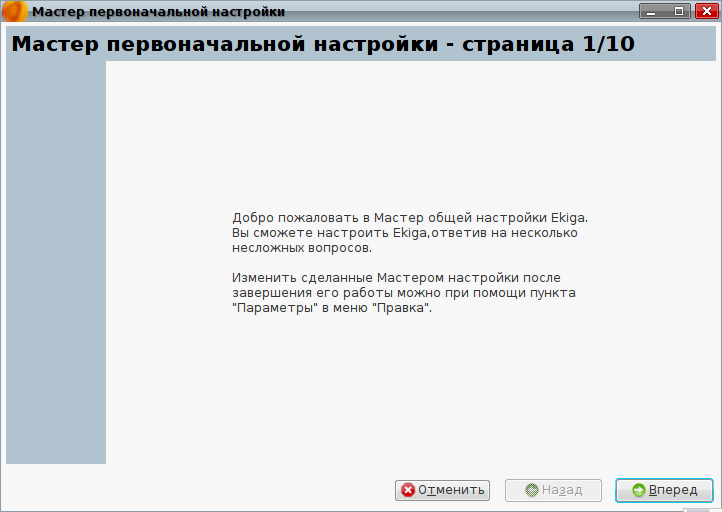
Здесь вбиваем любые 2 слова латиницей
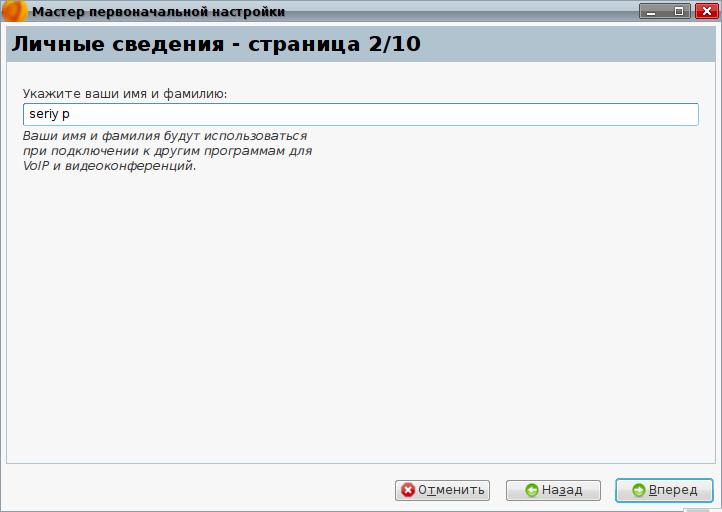
Здесь, в принципе можно написать что угодно, главное ОТМЕТИТЬ ГАЛОЧКОЙ «Я не хочу подписываться на бесплатный сервис Ekiga.Net»
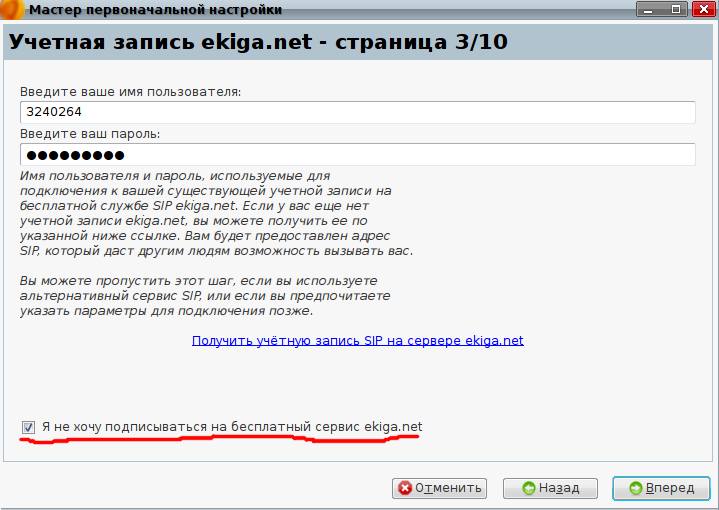
Просто нажимаем далее и т.п.
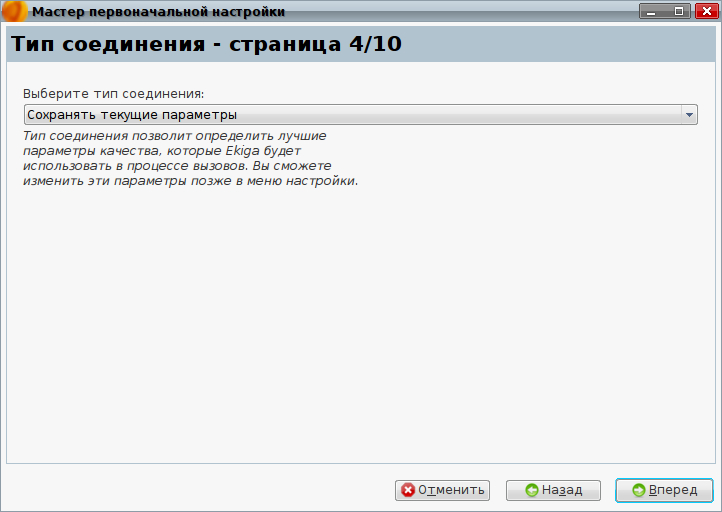
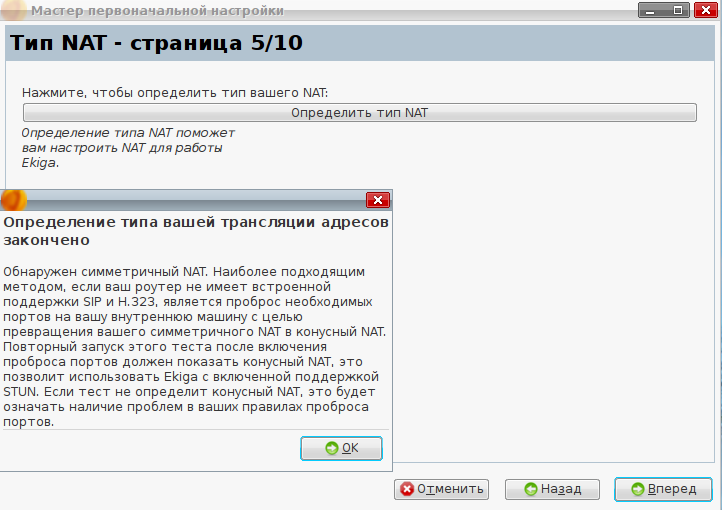
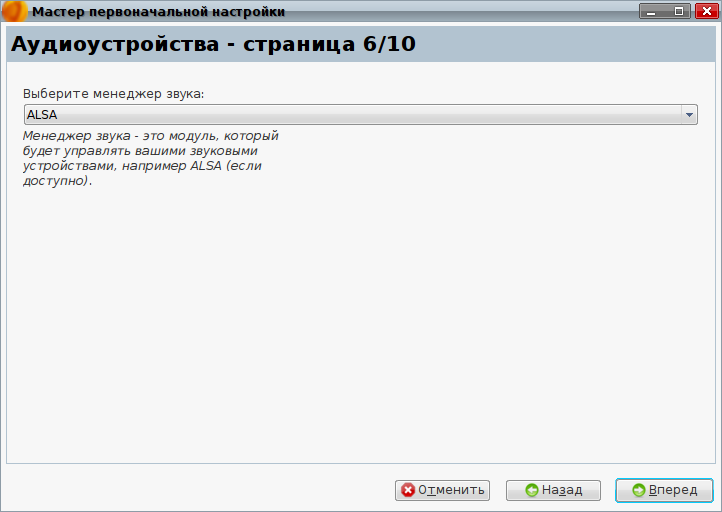
Вот тут для меня началось самое интересное: настройка аудиооборудования. Нажимаем на кнопку «Проверка параметров». Если сразу ругается — переходим Система—Выбор мультимедийной системы и пробцем менять значения на вкладке «Аудио». Параллельно можно запустить программу звукозаписи и пробовать записат с микрофона и затем воспроизвести звук

Если сразу не заработает все, запускаем програмку alsamixer и дрючим ее, особенно такие пункты, где присутствует слово Mic или Capture. Нужно добиться того, что при работающем тесте шага 7/10 при произнесении звуков в микрофон они воспроизводились через колонки (наушники) спустя некоторое время (4 секунды)

Ну, веб-камеры у меня нет, поэтому следующие пункты проскочил без разбора
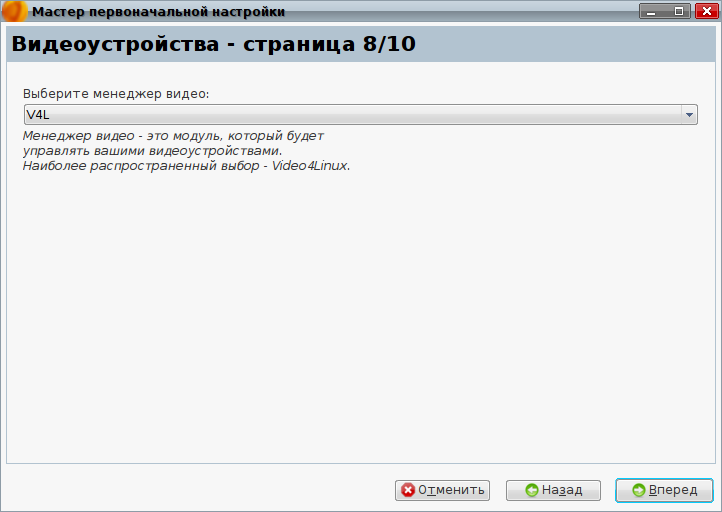
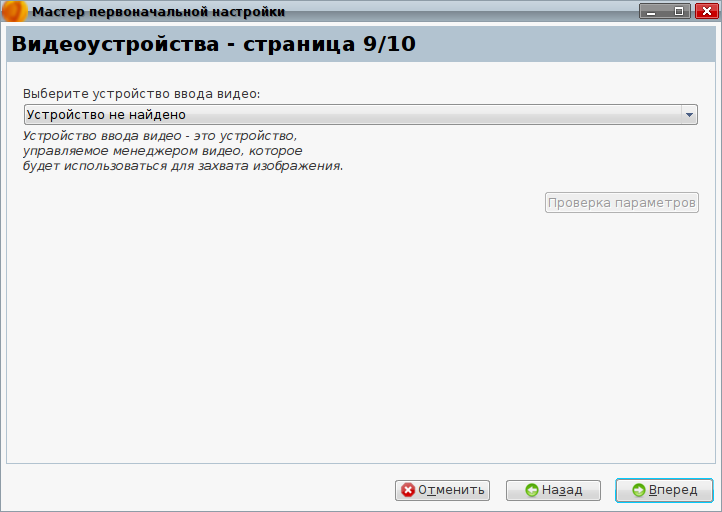
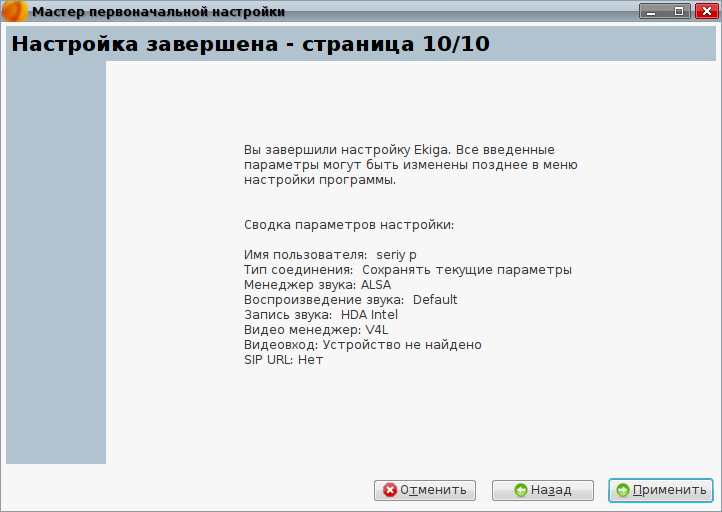
Ну, основная настройка завершена, осталось добавить учетные записи SipNet

Поле ——|— Значение Учетная запись ——Имя записи — м/б любое Регистратор — sipnet.ru Пользователь —- @sipnet.ru Пароль —- Пароль для входа в личный кабинет на сайте

источник
Інші пакунки пов’язані з ekiga
-
-
dep:
gconf-service - GNOME configuration database system (D-Bus service)
-
dep:
-
-
dep:
gconf2
(>= 2.28.1-2) - GNOME configuration database system (support tools)
-
dep:
-
-
dep:
gnome-icon-theme - GNOME Desktop icon theme also a virtual package provided by
lubuntu-icon-theme
-
dep:
-
-
dep:
libatk1.0-0
(>= 1.12.4) - ATK accessibility toolkit
-
dep:
-
-
dep:
libavahi-client3
(>= 0.6.16) - Avahi client library
-
dep:
-
-
dep:
libavahi-common3
(>= 0.6.16) - Avahi common library
-
dep:
-
-
dep:
libavahi-glib1
(>= 0.6.16) - Avahi GLib integration library
-
dep:
-
-
dep:
libboost-signals1.65.1 - managed signals and slots library for C++
-
dep:
-
-
dep:
libc6
(>= 2.14) - GNU C Library: Shared libraries also a virtual package provided by
libc6-udeb
-
dep:
libc6
(>= 2.17)
-
dep:
libc6
(>= 2.4)
-
dep:
-
-
dep:
libdbus-glib-1-2
(>= 0.88) - deprecated library for D-Bus IPC
-
dep:
-
-
dep:
libgcc1
(>= 1:3.0) - GCC support library
-
dep:
libgcc1
(>= 1:3.5)
-
dep:
-
-
dep:
libgconf-2-4
(>= 3.2.5) - GNOME configuration database system (shared libraries)
-
dep:
-
-
dep:
libgdk-pixbuf2.0-0
(>= 2.22.0) - GDK Pixbuf library
-
dep:
-
-
dep:
libglib2.0-0
(>= 2.37.3) - GLib library of C routines
-
dep:
-
-
dep:
libgtk2.0-0
(>= 2.24.31) - GTK+ graphical user interface library
-
dep:
-
-
dep:
libldap-2.4-2
(>= 2.4.7) - OpenLDAP libraries
-
dep:
-
-
dep:
libnotify4
(>= 0.7.0) - sends desktop notifications to a notification daemon
-
dep:
-
-
dep:
libopal3.10.10 - Open Phone Abstraction Library — successor of OpenH323
-
dep:
-
-
dep:
libpango-1.0-0
(>= 1.14.0) - Layout and rendering of internationalized text
-
dep:
-
-
dep:
libpt2.10.11 - Portable Tools Library
-
dep:
-
-
dep:
libsasl2-2 - Cyrus SASL — authentication abstraction library
-
dep:
-
-
dep:
libstdc++6
(>= 5.2) - GNU Standard C++ Library v3
-
dep:
-
-
dep:
libx11-6 - X11 client-side library
-
dep:
-
-
dep:
libxext6 - X11 miscellaneous extension library
-
dep:
-
-
dep:
libxml2
(>= 2.7.4) - GNOME XML library
-
dep:
-
-
dep:
libxv1 - X11 Video extension library
-
dep:
-
-
rec:
gvfs - userspace virtual filesystem — GIO module
-
rec:
-
-
rec:
yelp - Help browser for GNOME
-
rec:
Other Packages Related to ekiga
-
-
dep:
gconf-service - GNOME configuration database system (D-Bus service)
-
dep:
-
-
dep:
gconf2
(>= 2.28.1-2) - GNOME configuration database system (support tools)
-
dep:
-
-
dep:
gnome-icon-theme - GNOME Desktop icon theme
-
dep:
-
-
dep:
libatk1.0-0
(>= 1.12.4) - ATK accessibility toolkit
-
dep:
-
-
dep:
libavahi-client3
(>= 0.6.16) - Avahi client library
-
dep:
-
-
dep:
libavahi-common3
(>= 0.6.16) - Avahi common library
-
dep:
-
-
dep:
libavahi-glib1
(>= 0.6.16) - Avahi GLib integration library
-
dep:
-
-
dep:
libboost-signals1.58.0 - managed signals and slots library for C++
-
dep:
-
-
dep:
libc6
(>= 2.14) - GNU C Library: Shared libraries also a virtual package provided by
libc6-udeb
-
dep:
libc6
(>= 2.17)
-
dep:
libc6
(>= 2.4)
-
dep:
-
-
dep:
libdbus-glib-1-2
(>= 0.88) - simple interprocess messaging system (GLib-based shared library)
-
dep:
-
-
dep:
libgcc1
(>= 1:3.0) - GCC support library
-
dep:
libgcc1
(>= 1:4.1.1)
-
dep:
libgcc1
(>= 1:4.4.0)
-
dep:
libgcc1
(>= 1:4.7)
-
dep:
-
-
dep:
libgconf-2-4
(>= 3.2.5) - GNOME configuration database system (shared libraries)
-
dep:
-
-
dep:
libgdk-pixbuf2.0-0
(>= 2.22.0) - GDK Pixbuf library
-
dep:
-
-
dep:
libglib2.0-0
(>= 2.37.3) - GLib library of C routines
-
dep:
-
-
dep:
libgtk2.0-0
(>= 2.24.0) - GTK+ graphical user interface library
-
dep:
-
-
dep:
libldap-2.4-2
(>= 2.4.7) - OpenLDAP libraries
-
dep:
-
-
dep:
libnotify4
(>= 0.7.0) - sends desktop notifications to a notification daemon
-
dep:
-
-
dep:
libopal3.10.10 - Open Phone Abstraction Library — successor of OpenH323
-
dep:
-
-
dep:
libpango-1.0-0
(>= 1.14.0) - Layout and rendering of internationalized text
-
dep:
-
-
dep:
libpt2.10.10v5 - Portable Tools Library
-
dep:
-
-
dep:
libsasl2-2 - Cyrus SASL — authentication abstraction library
-
dep:
-
-
dep:
libstdc++6
(>= 5.2) - GNU Standard C++ Library v3
-
dep:
-
-
dep:
libx11-6 - X11 client-side library
-
dep:
-
-
dep:
libxext6 - X11 miscellaneous extension library
-
dep:
-
-
dep:
libxml2
(>= 2.7.4) - GNOME XML library
-
dep:
-
-
dep:
libxv1 - X11 Video extension library
-
dep:
-
-
rec:
gvfs - userspace virtual filesystem — GIO module
-
rec:
-
-
rec:
yelp - Help browser for GNOME
-
rec:
